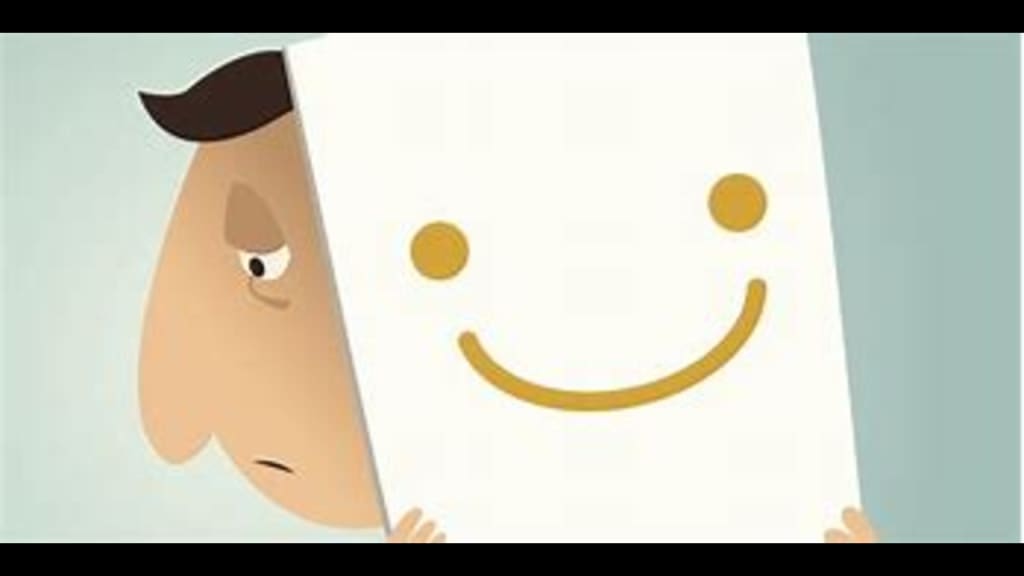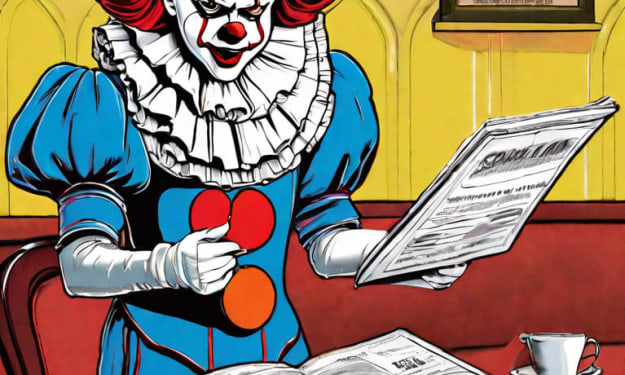9 Things Depression Makes You Want to Hide
Depression is a challenging and complex mental health condition that affects people in various ways. One common aspect many with depression experience is a desire to keep their struggles under wraps. Whether you’re personally going through the tough journey of depression or seeking a better understanding to support someone you care about, we’ve got you covered. By openly discussing and addressing these hidden aspects, we hope to break the silence and reduce the stigma surrounding depression.
By Nwanya PaschalPublished 9 months ago • 5 min read
Like
Share

Here are nine things depression often makes you want to hide!
- - Inner Turmoil and Negative Thoughts Depression is accompanied by a whirlwind of emotions, negative thoughts, and self-doubt; and you might feel like you need to hide these inner struggles from others. You're afraid that you are a burden to others, or fear their sharing of your thoughts will scare them away. Now, you have the choice of putting on a nice face and showing your other side to the world. Although it looks like a way to guard yourself, this may make the rest of us less able to understand just how much you're struggling and what kind of support you need.
- - Intense Feelings of Loneliness and Isolation Dealing with depression often leaves you feeling like you're trapped in a deep, dark hole; completely isolated and convinced that no one else could possibly understand what you're going through. But one of the major obstacles in how you open up about your emotions to others can be fear of being misunderstood. You think they’ll judge you or dismiss your symptoms as just being in your head. This can be super discouraging and make you want to just clam up and keep everything buried inside.
- - Perpetual Exhaustion and Fatigue Depression saps your energy and leaves you feeling depleted - like you have nothing left to give. Physically, depression manifests as a constant low-grade fatigue; while mentally, it’s like someone has turned down the brightness knob, leaving your mind in a heavy fog. The pressure to preserve a facade of normality is what makes it all so complicated. Many of us are told by society to be strong and cohesive; so you're getting used to masking your exhaustion through fake smiles and assurances that you "just do it right." You may feel overwhelmed and defeated when you constantly try to show a false front. You're operating at half capacity, unable to satisfy your own expectations or those imposed on you by others.
- - Loss of Interest and Enjoyment Depression has a way of taking the wind out of your sails. Everyday activities that used to bring joy feel like a chore - or just empty and joyless. Now it feels like a spark that had once ignited your passion is gone. It's also normal to hide that feeling of indifference and it just creates a barrier in your relationship with other people. Suddenly, social events that used to be fun and exciting are a burden. You're making excuses so you can avoid them. Or maybe you don’t want to disappoint loved ones by not appearing invested in the things that used to bring you happiness, so you pretend. However, it will often result in a sense of isolation and detachment.
- - Self-Care Struggles Living with depression can, at times, make even the most basic self-care tasks feel overwhelmingly challenging. It becomes an insurmountable obstacle to take a shower, eat nutritious food or get sufficient sleep. It's as if these simple acts require a great deal of effort and willpower, draining you both physically and emotionally. The fear of judgment and mistaken belief from others is always a major part of these struggles. You may feel like hiding the problems that you're dealing with, fearing it will be seen as laziness. And that fear of being judged or not understood can reinforce the isolation and loneliness that depression often brings.
- - Financial Struggles When you’re struggling with depression, staying on top of your work tasks and performing at your best can be tough, and this can lead to job instability. Similarly, depression makes it challenging to focus, stay motivated, and make sound financial decisions. Furthermore, the shame and fear of being seen as a failure can worsen the effects of depression on your job and financial situation. Fears of what other people will think, or the belief that asking for help is a sign of weakness, cause you to hide your financial difficulties. Unfortunately, keeping your financial struggles hidden can intensify the stress and anxiety you experience due to depression. It creates a cycle where you’re not addressing the challenges you face, which further impacts your mental and financial health.
- - Pile-Up of Uncompleted Tasks It can be incredibly challenging to navigate life when depression weighs you down. No matter how small or simple it may seem to others, all of this is going to become an uphill battle. Even the most basic tasks are made difficult by fatigue and lack of energy or willpower, as well as overwhelming sadness. Then feelings of shame and guilt are often exacerbated, when the remaining tasks begin to pile up. You begin to blame yourself and think that you are weak or incapable of handling your responsibilities.
- – Self Harm or Substance Abuse When dealing with depression and trying to cope, it’s not uncommon to resort to self destructive behaviors. These behaviors vary and can include substance abuse, alcoholism, self harm, overeating, or even engaging in risky intimate encounters. While these coping mechanisms may provide a temporary sense of relief and distraction from emotional pain, the consequences are often not very good. In addition, when you engage in such behavior, it usually leads to feelings of shame and guilt, which in turn leads to a vicious cycle, where you just want to hide your behavior so that you don't disappoint your loved ones.
- - Treatments or Medication Therapy and medication both work well for treating depression. Your overall well-being could benefit considerably from these therapy alternatives. However, discussing them can occasionally be awkward. Due to the anxiety of being viewed negatively or stigmatized, talking about medicine and therapy can be challenging. You fear that your difficulties will be downplayed, invalidated, or that you will be characterized as weak. Such concerns can restrict the opening up of dialogue, as well as impede your request for help. Depression is not something that you have to face alone. There's a lot of people out there who are prepared to help you, whether they're friends or trained professionals. But it may be difficult at first to open up about things like this, but we can make huge and brave steps forward in our recovery. Don't be scared of letting others in, accepting their support. On your journey to health, it can have a big impact.
CONCLUSION
acknowledging and openly discussing the challenges posed by depression is not a sign of weakness, but a testament to strength and resilience. By shedding light on the hidden aspects of this journey, we pave the way for a more compassionate and informed approach to mental health. Embracing the power of openness and connection can lead to a brighter, more hopeful future for those battling depression and those supporting them along the way.
About the Creator
Nwanya Paschal
Welcome!
This space highlights various points that reach from wellbeing and health to love and relationships, psychology, personal development, inspiration, fascinating realities, and much more.






Comments
There are no comments for this story
Be the first to respond and start the conversation.